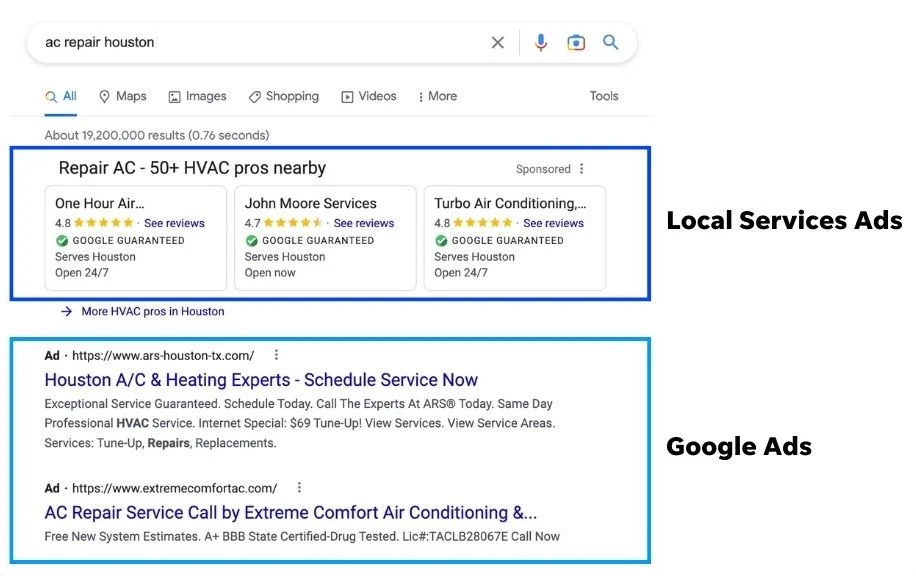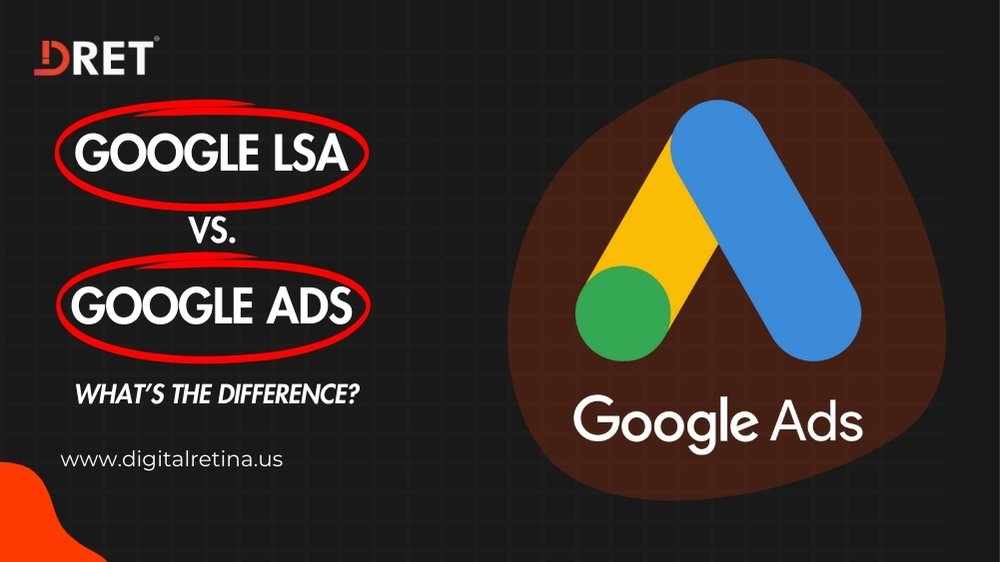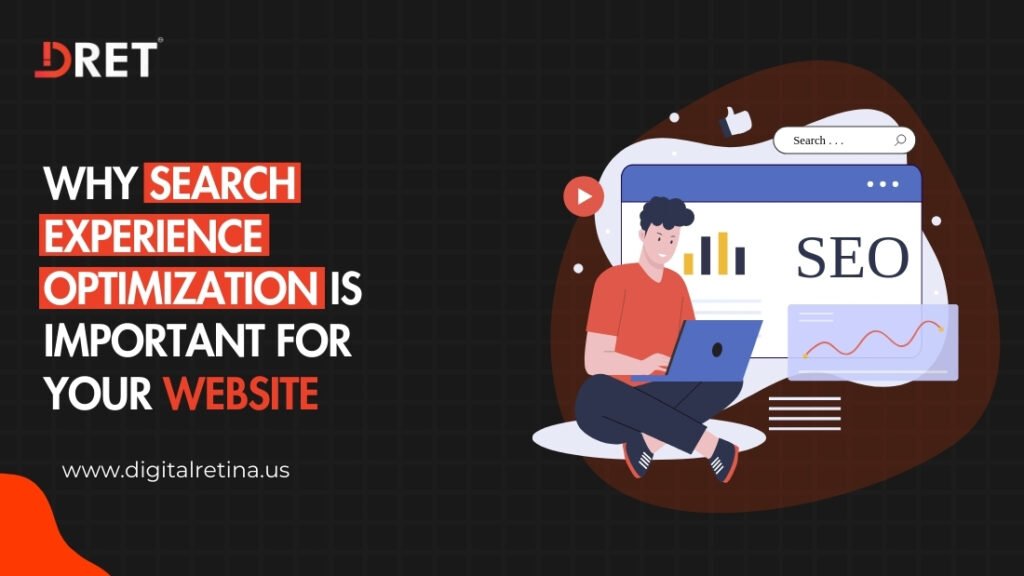
In the ever-evolving landscape of digital marketing, businesses constantly seek ways to maximize their online presence. Among the plethora of advertising options available, Google Ads and Local Services by Google (LSA) stand out as two of the most powerful tools. However, each serves a distinct purpose, and understanding the differences between them is crucial for businesses looking to make informed decisions.
This blog, presented by Digital Retina, will delve into the key differences between Google LSA and Google Ads, highlighting their unique features, benefits, and how they can be strategically used to achieve your business goals.
Google Ads, previously known as Google AdWords, is a pay-per-click (PPC) advertising platform enabling businesses to design and display ads across Google’s search engine and its network of partner sites. Google Ads is versatile and can be used to achieve various marketing objectives, from driving website traffic to increasing sales and generating leads.
Key Features of Google Ads
Versatile Ad Formats: Google Ads offers various ad formats, including text ads, display ads, video ads, shopping ads, and more. This versatility allows businesses to tailor their campaigns according to their specific goals.
Targeting Options: Google Ads provides extensive targeting options, allowing businesses to reach their desired audience based on demographics, interests, behaviors, and even specific keywords.
Budget Control: With Google Ads, businesses have full control over their budgets. You can establish daily or monthly spending limits to ensure your ad expenditures stay within your marketing budget.
Measurable Outcomes: A key advantage of Google Ads is its capability to deliver results that can be precisely measured. Businesses can track clicks, impressions, conversions, and other key metrics in real time.
Bidding Strategies: Google Ads offers various bidding strategies, such as cost-per-click (CPC), cost-per-thousand-impressions (CPM), and cost-per-acquisition (CPA), allowing businesses to choose the strategy that best aligns with their goals.
Local Services by Google, commonly referred to as LSA, is a relatively new advertising platform designed specifically for service-based businesses. Unlike traditional Google Ads, LSA focuses on connecting local businesses with potential customers searching for services in their area.

Key Features of Local Services Ads (LSA)
Local Targeting: LSA is designed to connect businesses with local customers. When someone searches for a service in a specific location, LSA ads appear prominently at the top of the search results, making it easier for potential customers to find and contact your business.
Pay-Per-Lead Model: Unlike Google Ads pay-per-click approach, LSA utilizes a pay-per-lead model. This means businesses are billed only when a potential customer reaches out to them through the ad, offering a cost-effective solution specifically tailored for service-based companies.
Google Guarantee: One of the standout features of LSA is the Google Guarantee badge. Businesses that pass Google’s screening and qualification process receive this badge, which builds trust with potential customers and can lead to higher conversion rates.
Simplified Setup: Setting up an LSA campaign is relatively straightforward compared to Google Ads. Businesses provide basic information about their services, service areas, and availability, and Google does the rest.
Lead Management: LSA provides businesses with tools to manage leads directly through the platform. You can track, communicate, and respond to potential customers, ensuring a seamless customer experience.
While both Google Ads and LSA offer significant benefits, they cater to different types of businesses and marketing objectives. Understanding the key differences between the two can help you choose the right platform for your needs.
1. Purpose and Target Audience
Google Ads: This platform is ideal for businesses looking to achieve a wide range of marketing goals, from brand awareness to lead generation and sales. It’s suitable for businesses of all sizes and industries, including e-commerce, B2B, and service-based businesses.
Local Services Ads (LSA): LSA is specifically designed for service-based businesses that operate in a local area. It’s perfect for businesses like plumbers, electricians, HVAC technicians, and other home service providers who want to connect with local customers.
2. Ad Placement
Google Ads: Ads created through Google Ads can appear across a variety of Google properties, including the search engine results page (SERP), Google Display Network, YouTube, and partner sites. This broad reach allows businesses to target customers at different stages of the buying journey.
Local Services Ads (LSA): LSA ads are placed at the top of Google’s search results, outranking both organic listings and traditional Google Ads. This prime placement ensures that your business is visible to potential customers searching for services in your area.
3. Cost Structure
Google Ads: Google Ads operates on a pay-per-click (PPC) model, where you are charged each time someone clicks on your ad. The cost per click fluctuates based on factors such as competition, the relevance of your chosen keywords, and your bidding strategies.
Local Services Ads (LSA): Operates on a pay-per-lead basis, so you only incur a cost when a potential customer reaches out to you through the ad. This can be more cost-effective for service-based businesses, as you’re paying for direct leads rather than just clicks.
4. Ad Creation and Management
Google Ads: Requires more effort in terms of ad creation, management, and optimization. Businesses need to create ad copy, select keywords, set bidding strategies, and continuously monitor and adjust their campaigns for optimal performance.
Local Services Ads (LSA): The setup and management of LSA campaigns are simpler and more streamlined. Google handles much of the work, including ad placement and optimization, allowing businesses to focus on managing leads and providing services.
5. Performance Tracking and Analytics
Google Ads: Provides detailed performance tracking and analytics, allowing businesses to measure the effectiveness of their campaigns. You can track a wide range of metrics, including clicks, impressions, conversions, and return on investment (ROI).
Local Services Ads (LSA): Offers basic performance tracking focused on lead management. Businesses can track leads, respond to inquiries, and manage customer interactions directly through the LSA platform.
Google Ads is a powerful tool for businesses looking to achieve a wide range of marketing objectives. It’s particularly effective for:
E-commerce Businesses: Google Ads can drive traffic to your online store, increase sales, and boost brand visibility.
B2B Companies: With extensive targeting options, Google Ads can help B2B companies reach their ideal audience and generate high-quality leads.
Brand Awareness Campaigns: Google Ads is ideal for businesses looking to increase brand awareness and reach a broad audience across different platforms.
Businesses with Larger Budgets: Given the cost-per-click model, Google Ads may require a larger budget, especially in competitive industries. Despite the higher costs, the potential for substantial returns makes it a valuable investment.
When to Use Local Services Ads (LSA)
Local Services Ads are best suited for service-based businesses that operate in a specific geographic area. LSA is particularly effective for:

Home Service Providers: Plumbers, electricians, HVAC technicians, and other home service providers can benefit from the local targeting and lead generation capabilities of LSA.
Businesses Looking for Cost-Effective Lead Generation: The pay-per-lead model of LSA ensures that you’re only paying for direct customer inquiries, making it a cost-effective option for lead generation.
Businesses Focused on Building Trust: The Google Guarantee badge adds an extra layer of trust and credibility, making it easier to convert leads into customers.
Both Google Ads and Local Services Ads offer unique advantages for businesses looking to enhance their online presence. Google Ads provides versatility and reach, making it suitable for a wide range of industries and marketing objectives. On the other hand, Local Services Ads are specifically designed for service-based businesses looking to connect with local customers cost-effectively.
Elevate your digital marketing strategy. Contact Digital Retina today to discuss how we can help you achieve your goals through tailored Google Ads and Local Services Ads strategies. Whether you’re looking to expand your reach with Google Ads or generate high-quality local leads with LSA, our team of experts is here to guide you every step of the way.




